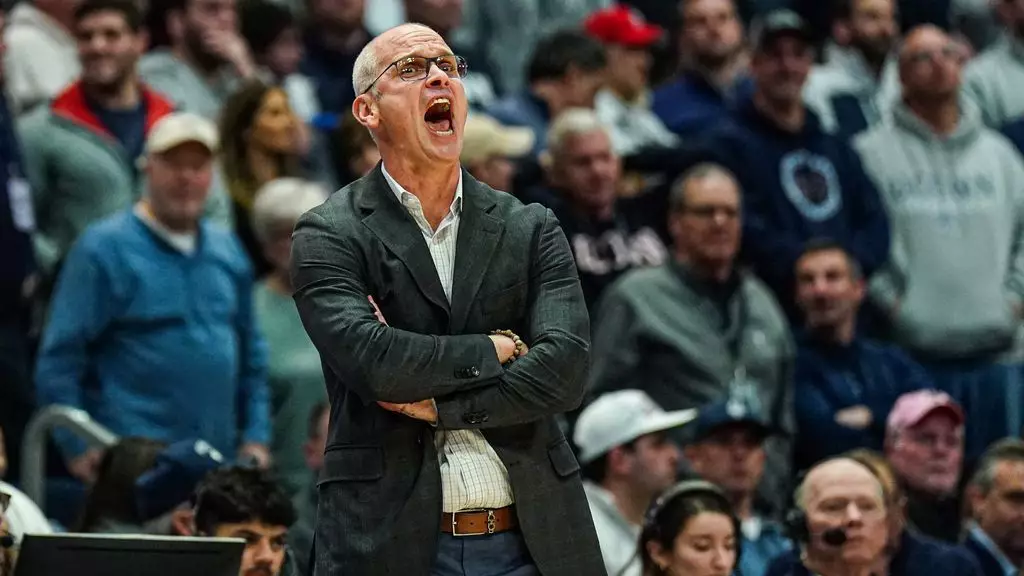In the high-stakes world of collegiate athletics, where victories are celebrated and losses scrutinized, coaches are often held under a magnifying glass. Dan Hurley, the fiery coach of the University of Connecticut men’s basketball team, recently found himself in a whirlwind of controversy following his candid remarks about officiating after a heartbreaking NCAA tournament defeat. Listening to Hurley’s retrospective evaluation, one can discern the duality of leadership: the fierce competitor who fights tooth and nail for his players’ success, and the aware mentor, burdened with the weight of responsibility for his words and actions.
It’s easy to throw stones from the sidelines, especially when expressing raw emotions in the heat of battle. Hurley’s admission that there are aspects of his behavior he “wishes he didn’t do” resonates with anyone who has faced a difficult loss. While some may dismiss such feelings as typical sportsmanship, they reveal a deeper narrative: the struggle between passion and professionalism. Hurley’s candid acknowledgment of his impulsive remarks highlights a critical fact—coaches are not just strategists; they are human, navigating the waves of adrenaline, frustration, and defeat.
The Burden of Leadership
Of particular note is Hurley’s reflection on how these emotional outbursts can redirect attention from the achievements of his team. In his defense, he argued that the circumstances of the game were extraordinary, marking the end of a remarkable three-year run. This commentary exposes a fundamental truth: the burden of leadership often shapes the narrative surrounding any organization. Rather than focusing solely on the remarkable players and their contributions, reporters and fans hone in on Hurley’s missteps, overshadowing the very essence of a team effort.
The scrutiny surrounding Hurley’s behavior touches on a larger issue in sports culture—the expectations placed on leaders to uphold a veneer of decorum in tumultuous situations. Are moments of raw honesty, especially in the aftermath of loss, a reflection of poor leadership or a necessary part of their persona? By dissecting Hurley’s candor, we invite a conversation about the broader implications of accountability in high-pressure environments.
Behind Closed Doors
The incident also shines a light on the culture of sports media, where every word and action is subjected to public examination. Hurley expressed regret over the manner in which his comments were filmed and disseminated, suggesting there are boundaries that should be respected, especially in unscripted moments of emotional vulnerability. “That’s not for camera phones,” he stated, hinting at an unsaid agreement that exists in such high-pressure environments.
It’s a sobering reminder that the sanctity of private exchanges, particularly in moments of intense emotion, is often compromised in the pursuit of storytelling. This raises ethical questions around the role of sports media: should they prioritize transparency or tact? By choosing to air his grievances in a vulnerable moment, Hurley inadvertently opened a floodgate of scrutiny that might obscure the lessons this experience offers both athletes and coaches alike.
The Compassionate Coach Versus the Scapegoat
Moreover, Hurley’s reflective remarks about his staff highlight another layer of this complex narrative. The situation escalated to the point where UConn’s director of men’s basketball communications, Bobby Mullen, felt compelled to act defensively, underscoring the tight-knit nature of sports teams. This brings to forefront a poignant question; in a culture where coaches are often unduly vilified for their missteps, should we not also acknowledge the human experience behind those choices?
Hurley’s rhetoric implies a cautionary tale for aspiring leaders: recognize the delicate balance between passion and control. While he maintains that he wouldn’t change his coaching style—one filled with intensity and engagement—the reality is that the narrative around emotional leaders like him is fraught with peril. In an age where accountability is held to a microscope, visceral expressions of disappointment might serve as both a rallying cry for players and a moment of scrutiny for coaches.
Ultimately, Dan Hurley’s experience compels us to consider what it means to truly lead in the volatile landscape of collegiate sports. It challenges traditional perceptions, urging us to embrace complexity in leadership while advocating for an understanding of the human experience that fuels fiercely competitive environments.


Leave a Reply